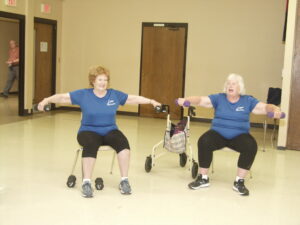Cheryl Reissmann has been involved with the StrongWomen program since 2009, when she attended a class at the former Thompson Community Center.
“The side-leg raise just killed me,” she said. “And I asked myself, ‘Why am I doing this?’”

Because her leg muscles were so weak, she got leg cramps from doing the exercise. But she persevered and not only completed the multi-week session but exceled at it. She was encouraged to consider leading a class. After some thought, she took the training and began leading classes at the center. Her intention was just to be a sub.
Later that year, she convinced her friend, Jayne Heinrich, to attend the class. Heinrich noticed a dramatic improvement in her strength, endurance and flexibility after the first session.
Today – a decade later – both Appleton women continue to co-lead the program, which now is called StrongBodies. The evidence-based training program is sponsored by the Aging & Disability Resource Center of Calumet, Outagamie and Waupaca counties. It is designed to help men and women become or remain fit, strong and healthy.
The pair are members of the Retired & Senior Volunteer Program. RSVP members Diane Mandler and Jane Stevenson also volunteer to lead the program.
Carol Bloemer, the director of RSVP, said many RSVP programs across the country offer a program called RSVP Bone Builders.
“I loved the idea of offering an opportunity to be a leader, while keeping physically fit,” she said. “It is a win-win because the classes are affordable and conveniently placed throughout the Fox Cities.”
When Bloemer researched the StrongWomen program and compared it to Bone Builders, she realized that they were the same program developed at Tufts University. So she contacted Nancy Krueger, the ADRC wellness coordinator about a partnership.
“It is a little more difficult to recruit leaders because they must understand this program and follow it,” Bloemer said. “There are people who want to volunteer to lead exercise classes, but they have their own style. That doesn’t work. So Nancy ends up doing the recruiting from the participants in the classes. In reality, RSVP is not much of a partner, but we still love being part of promoting a healthy lifestyle!”
Reissmann, who had back surgery in 2018 and currently uses a walker, said StrongBodies motivates her to exercise at least twice a week.
“It holds me accountable,” she said. She also enjoys the fellowship in the classes and points out that many folks socialize outside of class.
Heinrich agrees.
“There is a camaraderie that has developed with the class,” she said. “Six or seven of the 20 members we have right now were there 8 or 9 years ago. I call them charter members. We know the benefit of it. There is a mindset of taking care of themselves, trying to eat healthy and staying active. If you would go around the group, they all are very involved in community. They are very positive people.”
The training program was developed by Tufts University. Extensive studies on the benefits of strength-training for middle-aged to older women include increased muscle mass and strength and reduced risk for osteoporosis and related fractures.
There are big benefits to co-leading the class. For one thing, there are two people present to observe the group.
Heinrich says that while many of the participants in their class could teach it because they have been with the program for so long, there is a benefit to having a leader observe their technique.
“It is a weight program, we use free weights, but your technique comes first,” she said. “Weight comes later.”
Reissmann echoes the importance of performing the exercises correctly before incorporating weight.
“For the wide-leg squat, I’m not comfortable yet to add weights because of my back surgery and balance,” she said. She also notes that all the exercises can be performed standing, rather than lying on the floor with modifications.
Another benefit for co-leaders is when one leader needs to be away, the other leader can conduct the class without having to find a substitute.
The pair both agree that StrongBodies holds them accountable.
“You can’t talk it unless you walk it,” Heinrich said.

